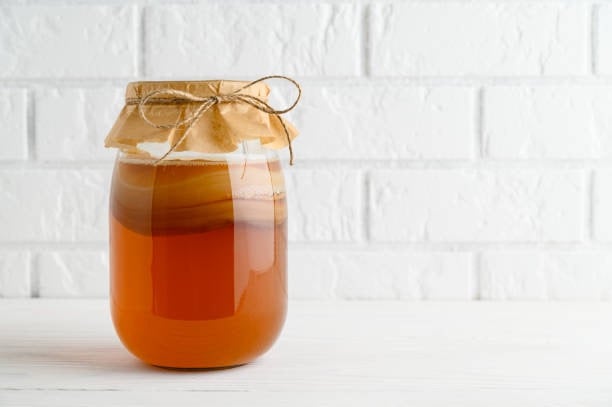"Kombucha Unveiled: The Wonder Elixir for Your Gut Health and Beyond"
Kombucha and its health benefits go far beyond just its taste. How this tea improves health and combats illness.
RECIPES
3/24/20245 min read


The Comprehensive Guide to Kombucha and Its Health Benefits
Introduction to the Fermented Phenomenon: Kombucha
Kombucha, a fermented tea drink, has captivated health enthusiasts and curious consumers alike with its tangy taste and purported health benefits. Originating from Northeast China around 220 B.C., kombucha was traditionally hailed as the "Immortal Health Elixir" by the ancients for its healing properties. Its popularity surged in the West in recent decades, positioning it as a staple in the diet of health-conscious individuals.
This effervescent concoction is made from sweetened tea fermented by a symbiotic colony of bacteria and yeast (SCOBY). This process yields a beverage rich in a variety of beneficial compounds, including probiotics, antioxidants, and organic acids, which are believed to contribute to its health benefits.
Kombucha's rise in popularity is largely due to its claimed benefits, ranging from improved digestion and detoxification to enhanced immune function and prevention of chronic diseases. In this blog, we delve deep into the science behind these claims, focusing particularly on kombucha's impact on gut health, its role in bolstering the body's defenses against illnesses, and the organs it purportedly cleanses. Drawing on evidence from the medical community, we aim to shed light on how this ancient brew can fit into a modern, healthy lifestyle and who might benefit the most from its inclusion in their diet.
What is Kombucha?
Kombucha's journey from tea to tonic is a fascinating interplay between microbiology and traditional brewing techniques. The base of kombucha is typically made from green or black tea, though variations using oolong, white, and herbal teas exist, affecting its nutritional and health profile. Sugar, added to the tea, serves as the fuel for the symbiotic culture of bacteria and yeast (SCOBY) that transforms the brew over a period of 7 to 30 days. During fermentation, the SCOBY consumes the sugar, producing a rich array of beneficial acids, gases, and alcohol in trace amounts, resulting in kombucha’s characteristic tangy flavor.
The nutritional content of kombucha can vary based on the tea used and the duration of fermentation. Generally, green tea-based kombucha is rich in antioxidants like catechins, known for their disease-fighting properties, while black tea-based kombucha contains theaflavins and thearubigins, which also offer significant antioxidant benefits. Regardless of the tea base, kombucha is a source of B vitamins, particularly vitamin B12, which is often challenging to obtain from plant-based sources, making it a valuable addition to vegetarian and vegan diets.
Gut Health Benefits
The gut health benefits of kombucha are primarily attributed to its probiotic content, the live microorganisms that confer health benefits to the host. The fermentation process enriches kombucha with a diverse microbiota, including bacteria and yeast strains that are beneficial to the gut. These include various species of Lactobacillus, Acetobacter, and Saccharomyces, among others. Such microbial diversity can enhance the gut flora, or microbiome, which plays a critical role in digestion, immune function, and even mental health.
Lactobacillus species, in particular, are noteworthy for their probiotic properties, contributing to a healthy gut by aiding digestion and inhibiting the growth of harmful bacteria. Consuming kombucha can introduce these beneficial bacteria into the digestive system, promoting a balanced microbial environment conducive to gut health and overall wellness.
Research underscores the significance of maintaining a diverse and balanced gut microbiome, linking it to reduced risks of gastrointestinal conditions, such as irritable bowel syndrome (IBS), and systemic health issues, including obesity and type 2 diabetes. By bolstering the population of good bacteria in the gut, kombucha may help fortify the body's defenses against such conditions, illustrating the interconnectedness of gut health with broader bodily functions.
Immune System Boosting Properties
How kombucha influences the immune system is a key area of interest. Antioxidants in kombucha play a significant role in disease prevention by neutralizing free radicals, which can damage cells and lead to chronic diseases. Scientific studies have linked kombucha to improved immunity, showcasing its potential as a supportive beverage in enhancing the body's natural defenses.
Detoxification and Organ Health
Kombucha's role extends to supporting detoxification processes, especially in the liver, kidneys, and blood, contributing to overall organ health. Its compounds aid in the removal of toxins and pathogens, supporting the body's natural pathways for maintaining health. Additionally, the impact of kombucha on skin health highlights its benefits beyond internal detoxification, showing potential for improved skin clarity and vitality.
Who Should Drink Kombucha? Guidelines and Precautions
While kombucha offers numerous health benefits, it's important for certain individuals, including those with compromised immune systems, pregnant and breastfeeding women, and people with pre-existing gastrointestinal conditions, to approach its consumption with caution. Beginners are advised to start with small amounts to gauge their body's response, gradually increasing their intake to allow for adjustment.
How to Make Kombucha at Home
Making kombucha at home is a rewarding process that allows you to customize the flavor and potency of this probiotic-rich beverage. Below, you'll find the basic ingredients needed and a step-by-step guide to brewing your kombucha.
Ingredients Needed:
1 gallon (about 3.8 liters) of purified water
8-10 bags of black tea or green tea (depending on your preference; avoid flavored teas as they can interfere with the fermentation process)
1 cup (200 grams) of white sugar (organic preferred; the sugar is necessary for fermentation and will be largely consumed by the SCOBY during the process)
2 cups (about 480 ml) of starter tea from a previous batch of kombucha or store-bought kombucha (unflavored and unpasteurized)
1 SCOBY (Symbiotic Culture Of Bacteria and Yeast) per fermentation jar, which can be obtained from a friend, online, or grown from a store-bought kombucha
Equipment:
1 large glass jar or container (1-gallon size or larger, to brew the tea)
Tightly woven cloth (like clean tea towels), coffee filters, or paper towels (to cover the jar)
Rubber bands or string (to secure the covering)
A non-metal stirring utensil
A funnel (optional, for bottling)
Bottles for storing kombucha (glass bottles with tight-sealing lids)
Steps to Make Kombucha
Prepare the Sweet Tea: Boil the water and dissolve the sugar in it. Remove from heat, add the tea bags, and let them steep until the water cools to room temperature. Using hot water for kombucha can harm the SCOBY.
Add the Starter Tea: Once the tea is cool, remove the tea bags and pour the sweet tea into your brewing jar. Add the starter tea. The starter tea makes the liquid acidic, which prevents harmful bacteria from growing in the initial days of fermentation.
Introduce the SCOBY: With clean hands, gently place the SCOBY into the jar. The SCOBY might float, sink, or sit sideways, which is perfectly fine.
Cover the Jar: Cover the mouth of the jar with a few layers of tightly woven cloth, coffee filter, or paper towel and secure it with a rubber band or string. This allows the kombucha to breathe while keeping out contaminants.
Ferment: Store the jar at room temperature, out of direct sunlight, for about 7 to 14 days. The duration will depend on your taste preferences and the temperature of your brewing area. Warmer locations generally lead to faster fermentation.
Taste Test: After 7 days, begin tasting the kombucha daily by gently inserting a straw beneath the SCOBY to take a sample. When it reaches a balance of sweetness and tartness that you like, it's ready for bottling.
Bottle: Remove the SCOBY and about 2 cups of the kombucha to save as starter tea for your next batch. Pour the remaining kombucha into bottles, using a funnel if necessary. You can add flavors at this stage by incorporating fresh fruit, juice, herbs, or spices.
Second Fermentation (Optional): To carbonate your kombucha, seal the bottles and let them ferment outside the refrigerator for another 2-7 days. Be cautious and check the bottles daily to avoid over-carbonation.
Refrigerate: Once your kombucha is carbonated to your liking, move the bottles to the refrigerator to slow fermentation. This will also help prevent the bottles from exploding due to built-up pressure.
Enjoy: Your homemade kombucha is now ready to enjoy! Remember to keep it refrigerated.
Conclusion
Kombucha, with its rich history and array of health benefits, presents a compelling addition to the diet for those seeking to enhance their well-being. By understanding its properties, health impacts, and the precautions necessary for safe consumption, individuals can make informed decisions about incorporating this ancient elixir into their modern lifestyle. Whether you're exploring kombucha for its taste or its health benefits, this guide provides a comprehensive overview to help you navigate its consumption responsibly and enjoyably.
